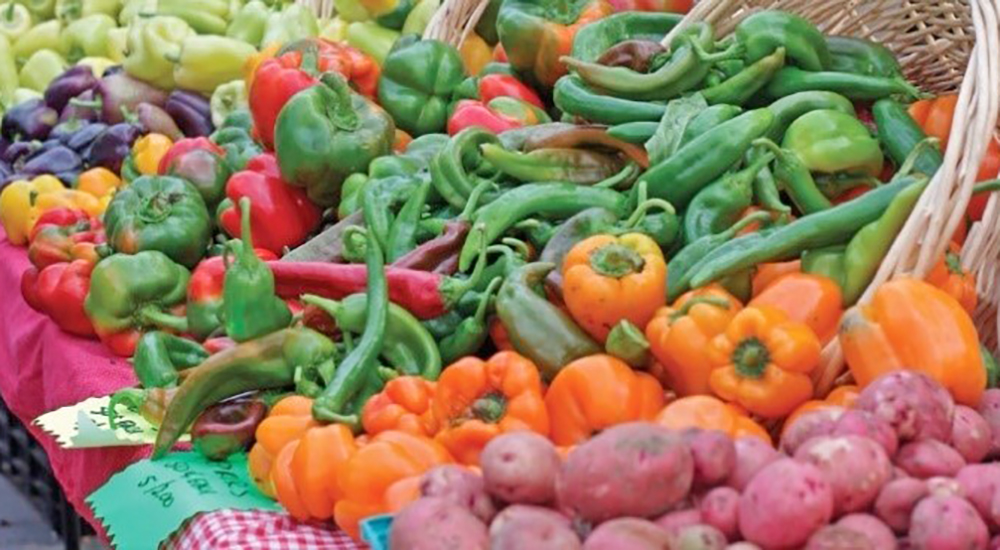Spring is here and, along with all the flowers popping up, so are all the amazing farmers markets across the country. Farmers markets have become an integral part of community life, growing in popularity due in part to our interest in obtaining fresh, locally sourced products direct from area farmers.
In 2021, the Department of Agriculture estimated 8,687 registered farmers markets in the United States, and the number continues to grow. It is difficult to provide an exact number of farmers markets in the United States since the number can vary depending on different sources and definitions of what constitutes a farmers market. Chances are good that there’s one near you.
Why buy local?
There are a lot of reasons to buy food that is grown close to your home. Five of the most relevant and impactful are:
- Fresher produce. Local produce is generally fresher since it doesn’t have to travel long distances before it reaches the market. This means it will have a longer shelf life and retain more of its nutrients and flavor.
- Supports local economy. Buying locally grown food supports local farmers and small businesses, which helps to boost the local economy. This helps to create jobs and keep money within the community.
- Promotes food security. Buying local food helps to promote food security by ensuring that there is a reliable source of fresh food available within the community.
- Builds community connections. Shopping at local farmers markets and getting to know the farmers who grow your food can help to build connections within the community. This can lead to a greater sense of community and social cohesion, which is important for overall wellbeing.
- Reduces environmental impact. By buying locally grown food, you are reducing the carbon footprint associated with transporting food over long distances. This can help to reduce greenhouse gas emissions and other environmental impacts associated with transportation.
Help your community while helping yourself
With rising food costs and inflation adversely affecting a growing number of Veterans experiencing food insecurity, farmers markets are a great way to save yourself money and help local farmers.
According to a 2021 report by Feeding America, approximately 1.3 million Veterans face food insecurity. This represents about 5% of all Veterans in the country. The report also found that Veterans who live in poverty or have a disability are more likely to experience food insecurity. Additionally, Veterans who live in rural areas or who have recently returned from deployment may also face unique challenges accessing healthy food.
Did you know that farmers markets are also a great way to get the most for your money?
5 ways to save at farmers markets
- Plan ahead. Before heading to the farmers market, look at what produce is in season and plan your meals accordingly. This will help you avoid overspending on items that are out of season or not necessary for your meal plan. Here is a seasonal produce guide.
- Shop toward the end of the day. Many vendors may be willing to offer discounts toward the end of the day in order to sell their remaining inventory. This is a great opportunity to get fresh produce at a discounted price.
- Bring cash. Some vendors may offer discounts for customers who pay in cash. By bringing cash, you may be able to save a few dollars on your purchase.
- Buy in bulk. If you have a large family or plan to use certain produce items frequently, consider buying in bulk. Many vendors may offer discounts on larger quantities, which can help you stretch your budget.
- Try something new. Don’t be afraid to try new fruits and vegetables that you may not have tried before. They may be less expensive than the more popular items, and you may discover a new favorite food that is also budget friendly.
The National Farmers Market Directory provides a list of farmers markets in your area. Area farmers markets may offer Veteran discount or incentives, and/or SNAP double up food bucks.
Topics in this story
Link Disclaimer
This page includes links to other websites outside our control and jurisdiction. VA is not responsible for the privacy practices or the content of non-VA Web sites. We encourage you to review the privacy policy or terms and conditions of those sites to fully understand what information is collected and how it is used.
More Stories
Bob Jesse Award celebrates the achievements of a VA employee and a team or department that exemplifies innovative practices within VA.
The Medical Foster Home program offers Veterans an alternative to nursing homes.
Watch the Under Secretary for Health and a panel of experts discuss VA Health Connect tele-emergency care.






